By Zaheer E. Clarke
Published September 26, 2016
Jamaica’s football is in desperate need of redevelopment in philosophy, infrastructure, and technical skills (goalscoring).
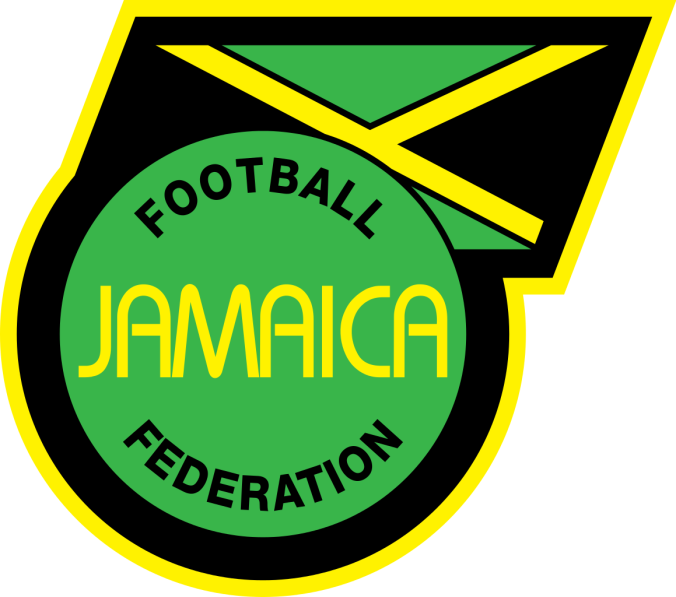
All over this beautiful island, enthusiasm and hearts sunk, lofty hopes and promises got debunked, and Jamaicans everywhere were seen staggering like blind drunks, as another campaign – on the road to wherever – figuratively and almost literally stunk (Enough with the rhymes).
This ill-conceived rhyming description above encapsulates Jamaica’s latest travail as it attempted to birth a place amongst the world’s elite teams at the 2018 FIFA World Cup. The pundits and analysts have all delivered their seething hindsight and 20/20 analysis, so why should I be any different?
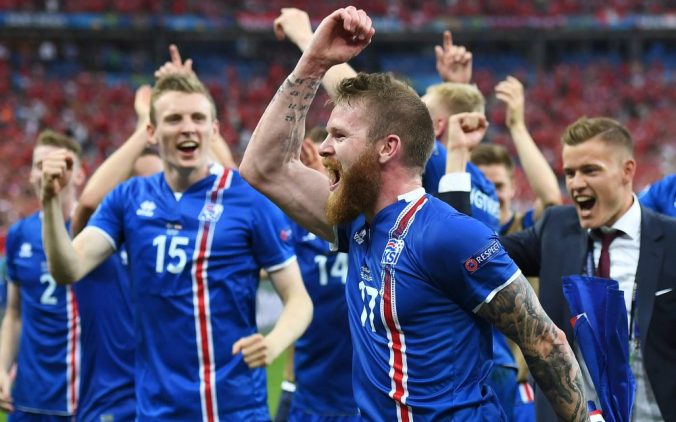
In the past 4 years, the Icelandic football team has moved from 131st to as high as 23rd in the FIFA Rankings (Photo credit: EPA)
In an article written a few months ago, titled “Jamaica could learn lessons from Iceland’s success”, I outlined Iceland’s fairytale run to the top tiers of world football, and the programs and policies that got them there. Eerily, Jamaica had a similar journey to the 1998 World Cup in France. However, since then, many have questioned the programs and policies, which have seen us fail to arrive at the final goal and destination in five consecutive trips.
The Jamaica Football Federation (JFF) has the direct or indirect mandate to develop the nation’s footballers on both the male and female side. Over the past 20 years, significant strides have been made in the development of coaches and players compared to the 20 years before. Increased FIFA funding has created the avenues for coaching clinics that have – hopefully – improved the quality of coaching and play seen on the field. For example, presently, each high school team is required to have a FIFA certified coach, however, more needs to be done. Though we are improving, compared to the elite teams of the world, we are still some distance behind.

1998 World Cup: Jamaica vs. Croatia 14 Jun 1998, Lens, France
© Christian Liewig/TempSport/Corbis
FOOTBALL FIELDS
Our fields have been a sore point for many moons. This directly affects the technical development of our players, the quality of play seen locally and the transitional effect to the international scene. A clear plan for capital investment in artificial or grass fields and proper management of these fields must be made and made now. The slapdash approach to this aspect of our football must be addressed forthwith. For example, for years, West Indies cricket left the preparation of their pitches and outfields up to the local cricket associations and unqualified groundsmen, who often possessed out-dated pitch and field management approaches. As a result, the West Indies Cricket Board (WICB) suffered humiliating abandonment of matches due to unsafe pitches and outfields. Cognizant of this, the WICB has implemented courses for their groundsmen in cricket: the same must occur in football via the JFF. The product and development of the game are too important for willy-nilly management and abandonment.
FOOTBALL PHILOSOPHIES
Similarly, a clear football philosophy through the coaching clinics must be implemented at the national level, at least or throughout the country. Players must be taught various philosophies and the mastery of these philosophies must be ensured. The lack of a unified philosophy on display in certain games has the players and the teams often looking like headless chickens against other quality opponents. The evident disorganization and haphazard play are unattractive, and with negative results, sponsors will not be attracted to invest money in future campaigns.
Table 1. The 1998 FIFA World Cup qualification points standings after the first 5 of 10 matches for each team
| Teams | GP | W | D | L | GF | GA | GD | Pts |
| Mexico | 5 | 3 | 2 | 0 | 13 | 2 | 11 | 11 |
| Costa Rica | 5 | 2 | 1 | 2 | 7 | 6 | 1 | 7 |
| USA | 5 | 1 | 3 | 2 | 8 | 6 | 2 | 6 |
| El Salvador | 5 | 1 | 2 | 2 | 3 | 4 | -1 | 5 |
| Canada | 5 | 1 | 2 | 2 | 1 | 7 | -6 | 5 |
| Jamaica | 5 | 1 | 2 | 2 | 2 | 9 | -7 | 5 |
KEY: GP = Games Played, W = Wins, D = Draws, L = Losses, GF = Goals For, GA = Goals Against, Pts = Points
GOALSCORING
For the past 20 years, for me, Jamaica has been malnourished in the goal-scoring department and there seems to be no abatement in this regard. Many fans and pundits refer to the 1998-storied World Cup campaign and our qualification; however, many forget our goal-scoring and goal-defending woes in the first half of that campaign.
In the first half of the final round of qualifying, Jamaica was at the bottom of the six-team table, having scored only two goals in five games – both scored by Andy “Bomber” Williams. In light of the team’s goalscoring plight, Rene Simoes incorporated Deon Burton, Paul Hall, Fitzroy Simpson, Robbie Earle and Frank Sinclair with the core of local-based players for the final five games. The move worked. Jamaica went undefeated, winning two and drawing three of the final five games to qualify. Deon Burton and Paul Hall created and scored the much-needed goals for Jamaica.
Since then, and with their retirements, Jamaica has returned to its malnourished ways in front of goal. For example, Winfried Schaefer has been in charge for 42 games and Jamaica has scored only 41 goals. For us to be among the elite teams in the CONCACAF and qualify for the World Cup regularly, we have to be able to score on average two or more goals per game.
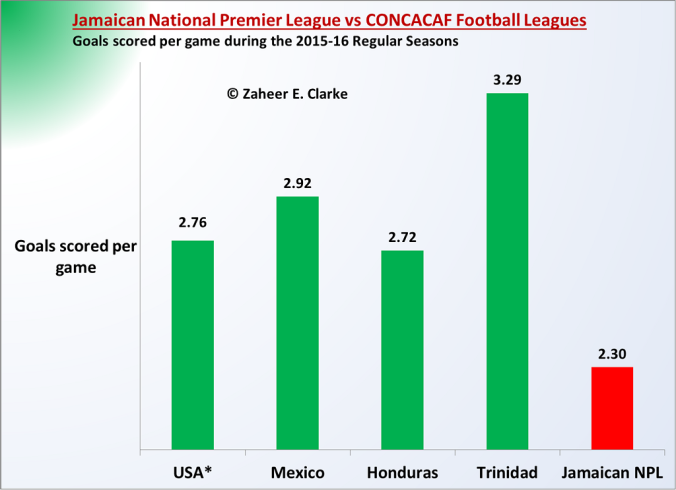
*USA = Major League Soccer 2015 regular season
Schaefer was often knocked, and rightfully so, for not blooding the local based players in his 2018 World Cup teams. However, on another point, the local-based players have not shown a propensity to score goals. In countries like USA, Mexico, Honduras and Trinidad – countries that have qualified for the CONCACAF 2018 World Cup qualifying final round – in their domestic leagues for last season, the average goals scored per game was 2.72 and more. This is on par with European leagues in England (EPL), Germany (Bundesliga) and Spain (La Liga) – the countries whose brand of football we enjoy so much. Their leagues encourage goalscoring and teams more often than not, play to win and not the negative brand of football in Jamaica, which is, not to lose.
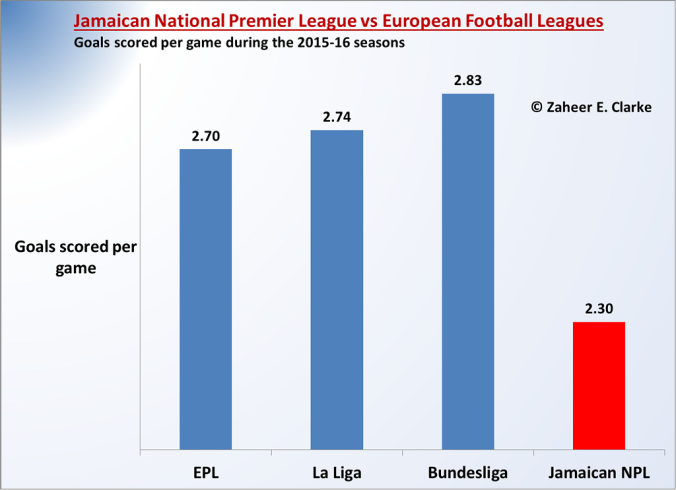
In the Red Stripe Premier League (RSPL) last season, the average goals per game was 2.30. On the face of it, it does not seem a huge difference – 2.7 vs. 2.3. However, for Jamaica to match the minimum levels of its CONCACAF or UEFA counterparts – 2.7 goals per game, locally, almost 100 more goals would have needed to be scored last year in the RSPL – yes, almost 100.
Jamaicans, whether locally in the domestic league or from overseas in the national colours, are not scoring enough goals. One reason is that goals are not celebrated in Jamaica parlours and barber salons. What is celebrated is how well you can shift and pile a player, as if aimless shifts and piles win games. What wins games is goalscoring. Hence, we have to develop our skillful footballers into astute goalscorers.
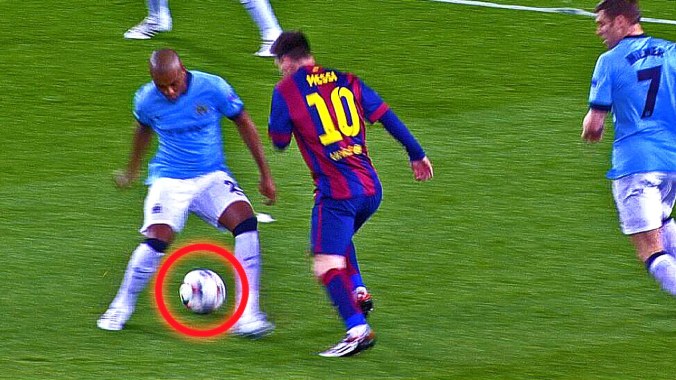
Lionel Messi nutmegs a Manchester City player in order to create space to get a shot off at goal
Truthfully, we have to change our thinking in terms of infrastructure, philosophy and technical skills (including goalscoring). If we do not, we will continue to endure disappoint.
Until next time…
© Zaheer Clarke
Zaheer E. Clarke is a freelance sportswriter, who was once the coach, manager and a player on a team of high school ‘nerds’ that walloped their high school Dacosta Cup team in a full game of football.
He can be reached at zaheer.clarke@gmail.com. Follow him on Facebook at Zaheer Facts, Lies & Statistics, or on Twitter at @zaheerclarke.
This blog article was also published in the Western Mirror on September 26, 2016.
Jamaican football is somewhat like the J$: you have better returns from investing in other ‘assets’. Local football is an inferior product in many regards: quality of play, quality of players, TV coverage, commentary and analysis, public support. Foreign football from Europe or US is better supported and gives better entertainment on all those metrics.
LikeLike